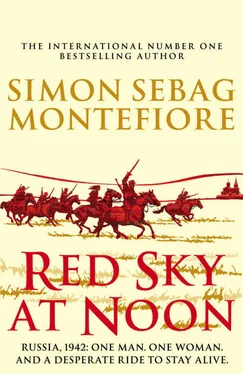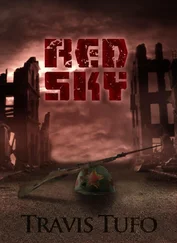‘Hey, Golden, look!’ They’ve found more Italian bodies in one of the cottages. There is a dead Italian officer on the doorstep, a splendid-looking fellow, tanned and immaculately dressed – shot neatly through the heart. Everyone stares at him – before the Criminals start stripping him of accoutrements. Smiley, Cut and Run, Cannibal Delibash and Koshka are working their way through the houses, looking for food, weapons, girls. At the moment of impact: screams and smashed glass; afterwards; a light symphony of sobbing. It is not the liberation the villagers deserved.
Spider Garanzha appears suddenly, wiping his sabre on the grass, his guess-what-I-just-did smile on his gaping shark mouth, and they join the men lazing in the churchyard, which now resembles a macabre gypsy banquet with food, bottles and bits of uniform scattered amidst the gravestones. Some of the men are still drinking in the sun and a few have passed out. Lying on his back, his bell-shaped head sunburnt to a fluorescent puce, propped up on a doubled-up mattress, his belly a swollen winesack (the only man ever to emerge with a paunch from the Camps), Fats Strizkaz gives his opinions on all matters. Did you see Koshka in the charge? What a coward! How Ganakovich is scared of war – don’t you notice when his voice goes high? Fats has a bottle of Italian wine which he happily shares with Smiley and Garanzha. Then he scopes Little Mametka, who has stolen the Italian officer’s gleaming boots, holster and dagger scabbard engraved with his initials.
‘Hey, Mametka, those boots are too big for you!’
Smiley raises a warning hand but Strizkaz won’t be restrained.
‘Hey! What? We all called him Bette Davis in Kolyma! Jaba made it up.’ That was true, thought Benya, but Mametka could take anything from Jaba, his Boss; he was younger then; and besides, Jaba had an affectionate way of saying it.
‘I apologized,’ Strizkaz drawls. ‘I apologized and you accepted it, right?’
Mametka looks twitchy. He nods gingerly.
‘It’s OK,’ Strizkaz tells Smiley and Garanzha. ‘I apologized and he accepted it…’ Then his face with its patch of moustache turns vicious again. ‘Didn’t you?’
‘Yes I did,’ said Mametka.
‘Yes you did,’ he bellows. ‘Bette Davis, you little fucking girl!’
And that is it. Like watching a reel of film that suddenly trips and jumps a few frames, Benya misses the first moves, and then he sees Mametka has grabbed one of the shovels and, twisting its blade in the air, is thrusting it again and again into Strizkaz’s throat with such power that his neck is virtually obliterated. Blood spatters all over him – a trip of the reel – before Benya and everyone else can even get to their feet to stop him… or join in. Then another jump in the reel and Smiley, Garanzha and a suddenly awakened Cut and Run Ivanov are beating Strizkaz with anything to hand: a rifle butt, another shovel and a slab of rock. Everyone else just looks on. When they are finished, they lug the unrecognizable Strizkaz into one of the half-dug graves and drop a tombstone down on top of him.
‘What the hell’s going on here?’ Ganakovich is coming up through the graveyard, gawping at Mametka and drawing his Nagant, but Smiley and Garanzha take no notice of him. ‘Lads, you need to tell me.’
‘I don’t think so,’ says Spider Garanzha.
‘Leave this to us!’ adds Smiley.
Ganakovich looks them up and down, replaces his pistol and heads back down to the priest’s house. The state has officially lost control of the Shtrafbat.
Smiley’s forehead is pointed, temple veins swollen and charged, and he has come into himself with that strain of pure forthrightness he was born with, the killer’s easiness – and there are moments that Benya envies it. But now not. He is desperate to get away from the graveyard. He hurries past Mametka, who is so besmeared that the blood looks like stage make-up – even his hair is congealed – and staggers down the lane to the Italian Red Cross tent, which is pitched on the far edge of the village.
‘What’s going on?’ asks Dr Kapto, who is still patching up some of the wounded Shtrafniki. ‘Something happened in the graveyard?’
‘Nothing… it can wait till you’re finished. Can I sit here?’ Benya is just happy to be in the wholesome peace of the tent of serene healing – away from the others. He should be shaking after what he has seen – but he isn’t. He prays Melishko will return soon and tell them the plan; there has to be a plan.
He watches the nurses Tonya and Nyushka working hard, sewing up wounds and dressing them. ‘I have no doubt we’ll advance soon,’ chatters the dimpled Nyushka. ‘The Great Stalin knows what he’s doing. He’ll have a plan for us.’ She’s always been a fanatical Stalinist despite being arrested and sent to Kolyma. He notices how well she looks. Even though the doctor and nurses have ridden with the squadrons for many hours, she still has a bruised ripeness about her, her cheeks a little sunburnt, her auburn hair streaked gold. ‘Comrade Ganakovich will know,’ she says innocently. ‘He always knows Stalin’s orders.’
‘Of course, he does,’ agrees Benya, remembering that she is now Ganakovich’s girl, his ‘front wife’.
He turns to Tonya: she and Kapto seem to communicate without words. When he cuts, she is already there with the cotton wool to dab the wound, predicting his moves with smudged, half-closed eyes set in a flat, expressionless face. Does she love Kapto or isn’t it like that? Is it her destiny to attend the doctor but never have him?
They sew up the last of the wounded. Breezy and direct, Kapto pats each patient on the side when he finishes: ‘There! All done! Easy, now, easy!’ Benya spots his uniform now boasts a captain’s pips and he has a leather satchel which he always wears over his shoulder and across his chest.
‘You got promoted, doctor? I hadn’t noticed.’
‘Looking after Melishko’s piles has its rewards,’ he says.
‘And the satchel?’
‘The morphine of course. Do you need some? How was the charge, Benya?’
‘Terrifying…’
‘I saw you. You were like a devil possessed. Since you gave up writing, you might have found your new metier but…’ He sighs. ‘A sabre can do terrible damage – as you now know.’ Benya feels guilty and yet somehow pleased with this new reputation for brutality. It is so unlikely. ‘Cigarette? I have Italian ones. Africas. Shall we get out of the village?’ Kapto says, stepping outside the tent and lighting up.
‘We need to avoid the churchyard,’ says Benya, ‘but it seems quiet in the fields. They just killed Fats.’
‘Revenge for what he was in the Camps. Only Melishko can control them,’ muses the doctor. ‘Is he back? Where on earth are we going next?’
Benya takes his rifle and Kapto draws his new sidearm, a handsome German Parabellum he has found in the village, and they stroll into the countryside where the fields have been harvested. Ahead of them, there’s a combine harvester burnt out on the field. Benya looks back at the village and it might be a summer afternoon in peacetime. A magpie stutters; a skylark dances. But on the horizon, the dust broils densely, tainting the cornflower-blue sky a dirty burgundy, and the crump of the artillery is constant. To the west, there’s the crackle of shooting quickfire and then single shots.
Kapto cocks his head: ‘Doesn’t sound like fighting.’ Smoke rises, not fuel black, perhaps burning stubble.
‘Think what we’ve been through,’ says Benya. ‘We’ve seen so many people gone…’
‘Don’t look back; don’t look forward,’ Kapto replies. ‘Like in the Camps. Just live through today. Everything is out of our control, but even here a man can still save a man.’
Читать дальше












